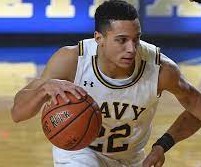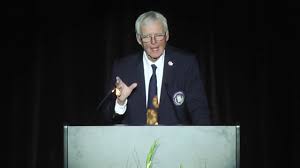It is a safe assumption that most people in the Navy enjoy the water, and Cam Davis is no different. He graduated with a 3.43 cumulative GPA as an ocean engineering major, and will continue his studies this summer as part of the MIT/Woods Hole Oceanographic Institute Joint Master’s program. He is not too shabby on the court either, as he was named 1st-Team All-Patriot League this year after leading his team with 17.1 PPG. Earlier today HoopsHD’s Jon Teitel got to chat with Cam about facing a future NBA All-Star in high school and the next step in his education.
You led your high school team to the 2016 Missouri Class 5 state championship game and scored 17 PTS in a loss to Chaminade: how good was Jayson Tatum (40 PTS/14 REB) back in the day, and could you tell at the time that he was going to become a superstar? He was good enough to put 40 PTS on my head! He was very polished even as a high school player and his game continued to explode at Duke and in the NBA. We had the feeling that he would be a top draft pick/great college player and he is now on pace to become 1 of the best NBA players ever from Missouri.
You were valedictorian at your high school: what made you choose Navy? My recruiting was going pretty slow into my senior year but 1 of my buddies was recruited by the Academy and graciously passed along my info to them. I talked to the coach and he was willing to take a chance on me. I went out and saw the campus and loved everything that it stood for. It was the perfect opportunity for me to step into and has helped me get to some pretty incredible places.
You were elected Athletic Teams Commander, commonly known as “Captain of Captains” at the academy: what is the key to being a good leader? An open line of communication between the people you are leading and the people who are leading you. I did my best to get done whatever needed to get done and people were able to voice their opinions. It was important for me to actively communicate with my athletes/captains and we did a good job of setting the standard.
Last January you were chosen for the MIT/Woods Hole Oceanographic Institute Joint Master’s program, which will combine course work in Cambridge with hands-on research at Woods Hole over the next 27 months: how excited were you to get selected, and what do you hope to do in the future as an ocean engineering major? That was probably my best day at the Academy besides graduating. We were at practice and 1 of my mentors showed up and announced it in front of everyone: I was speechless. The ocean is 1 of the last frontiers we have to explore: we know more about space than about the ocean. I want to contribute to finding out more about this ecosystem and what it can do to help us. I think it will be 1 of my most rewarding experiences.
You led your team in scoring during each of the past 2 years: what is the secret to being a good scorer? Just putting the work in. I was never the best player on any team I had played on and then I got thrown into the fire. My teammates looked up to me and saw that the work I had been putting in was paying off.
You started 13-2 last year but missed the final 3 games of the season due to COVID protocol: did you think that your team was going to beat Loyola MD in the Patriot League tourney after beating them 3 straight times in a 30-day stretch to finish the regular season, and how devastated were you after the 8-PT home loss? I was confident that we could take care of business at home…but it is really hard to beat a team 4 times in a row. If I would have been out there then I think we would have made the NCAA tourney, but that is how the cookie crumbles. I was not devastated because my last game at Navy was a win and not many people can end their career like that. I will hang my hat on that and hope to leave a legacy at Alumni Hall.
Last month you were named 3rd-team Academic All-American: what did it mean to you to receive such an outstanding honor? It is probably the most significant honor that I have ever received because it is about being more than just a basketball player. I am also a leader/scholar and I care about my academics so it meant the world to me. When you look at some of the other names on that list it is very humbling.
You recently graduated with a 3.43 GPA: how do you balance your work on the court with your work in the classroom? It is all about priorities/sacrifice. You can sometimes get stuck in “lazy mode” but you need an accountability partner to kick you in the butt. The Academy throws so many things at you that you cannot get everything done in 1 day so you have to prioritize things throughout the week. There is nothing unfair: they are trying to build you into an officer and my last 2 semesters featured the best grades I had at the Academy.
What was the hardest part of being a student during a pandemic, and what was the hardest part of being an athlete during a pandemic? As a student we had to attend online classes and it was so easy to become distracted: it is important to show your dedication. As an athlete there was continuous change with things getting canceled/rescheduled. You have no sense of time but you have to practice/play with a sense of urgency. The military is all about that so it prepared our team well.
Your parents Adrian and Christina both played D-2 basketball: who is the best athlete in the family? The best athlete in our family is actually my younger brother Adrian. He ran track/played football in high school: he can just glide across the track while also being able to lift 500 pounds. Basketball-wise it is me, no doubt. My dad used to let me win when I was a kid and then he realized that my confidence level had gotten too high! I give my parents all the credit for putting me in the gym and chasing my missed shots around. They taught me everything and I am so glad that I got to share it with them.










